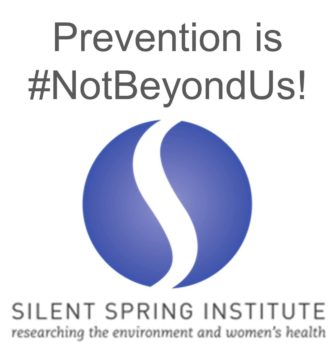 Silent Spring is an organization that researches the causes of cancer (versus the cure), with a particular focus on breast cancer. The founding of the organization was inspired by Rachel Carson and her book, Silent Spring. Carson was one of the first scientists to study the environmental causes of cancer, especially the chemicals we are exposed to in our everyday lives that are carcinogenic. (Think: furniture, mattresses, rugs, toys, kitchenware, household cleaners, etc.)
Silent Spring is an organization that researches the causes of cancer (versus the cure), with a particular focus on breast cancer. The founding of the organization was inspired by Rachel Carson and her book, Silent Spring. Carson was one of the first scientists to study the environmental causes of cancer, especially the chemicals we are exposed to in our everyday lives that are carcinogenic. (Think: furniture, mattresses, rugs, toys, kitchenware, household cleaners, etc.)
One of the organization’s main challenges is convincing people that researching cancer prevention is equally important as researching the cure. For their annual gala, they wanted a video that:
To accomplish #1, we asked the scientists questions, such as: “How and when did you get interested in science?” We focused on two stories that scientists shared from when they were children, and we made sure to get old photos of them as young kids (who doesn’t enjoy those old shots?!).
Not surprisingly, the conversations with the scientists sometimes veered into the technical. No problem! Playing the role of ignorant outsider, we were always able to take a step back with our interviewees and say, “OK, please help me understand this as a layperson.” Together we could figure out the language to translate complicated scientific ideas into simpler terms.
Showing the scientists as relatable and their work as understandable went a long way to making the case for prevention. This effort was enhanced by the passion of the Silent Spring’s supporters who also participated in the video. The key questions for them were: “Why is this important to you? And why should others support this cause?”
When making the case for your cause, particularly if it’s technical, reciting facts and figures is sometimes persuasive. But with a general audience, you are likely going to have a more compelling message if the techie people can reduce the “insider” jargon. Also, even though you only have a few minutes, try and find a way to reveal a little of who your video “characters” are. If the audience feels any kind of connection to them, they will be more receptive to hearing from your messengers.
Before our work with Silent Spring, we were, like many people, completely unaware of how many products in our lives contain toxins that are potentially cancer-causing. Though the list of these products is dauntingly long, we also learned that all of us can take small steps to move the needle. Most notably, we can make informed decisions with the everyday items we purchase – household cleaners, makeup, plastics etc. Not only does buying toxin-free products reduce our exposure, but it also sends a message to companies and manufacturers. When enough consumers change their buying habits, the market will adjust accordingly and for the better. Visit Silent Spring’s website for more information.